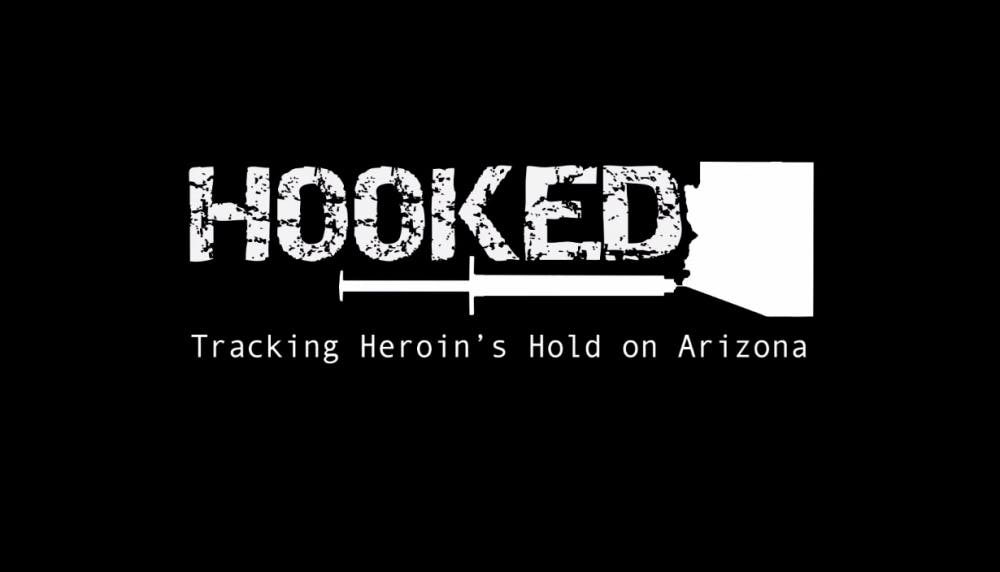In an unprecedented move for ASU, a documentary produced by the Walter Cronkite School of Journalism and Mass Communication will soon receive the highest honor from the Rocky Mountain Southwest Chapter of the National Academy of Television Arts & Sciences, the first ever given to a journalism school.
"Hooked: Tracking Heroin's Hold on Arizona," the 30-minute documentary, which was produced in collaboration between Cronkite and the Arizona Broadcasters Association, premiered last January to an audience of more than one million. It was broadcasted across 33 television stations, as well as 93 radio stations in Arizona.
The documentary followed the rise of heroin's presence across the state, deeply affecting anyone and everyone from users to the law enforcement officers who worked so hard to keep the substance from passing through the Arizona-Mexico border.
Jacquee Petchel, executive editor at Carnegie-Knight News21 and the primary faculty member involved in the production of "Hooked," said this award is not only reflective of the quality of teaching that faculty members are doing at Cronkite, but the quality of journalism the students are putting out as well.
"I think it speaks volumes to the quality of journalism being taught and practiced at Cronkite," she said. "Really, the achievement of the students is most important and stands out. This is an award for public service to the community and I can't think of anything better. The whole package at Cronkite gives aspiring journalists the groundwork to be successful and this award is a great example of that."
HOOKED: Tracking heroin's hold on Arizona from Cronkite on Vimeo.
Art Brooks, Arizona Broadcasters Association President and CEO, said the partnership between the Cronkite School and the organization helped unveil the issue of heroin use and addiction to those who were otherwise unaware.
"We thought this was critical enough for us in Arizona, we're kind of the Ground Zero where it crosses our border then it moves out throughout the United States by the drug cartel, so we decided we needed to do something," Brooks said.
At the time the documentary aired, Brooks said he was unaware of the type of exposure the documentary would bring to the underlying problems of opiate addiction for those who needed help.
"We had no perception that, before it aired, there would be a million people watching it on TV and another 250,000 listening to it on the radio," he said. "At the time, we weren't doing it for audience numbers, we were doing it to help those that need help, that are addicted to the drug."
During the broadcast, approximately 100 professionals and counselors made up a call center located within Cronkite, answering nearly 500 calls from viewers all over the state. Brooks said the number and duration of these calls speaks to the impact the documentary had on viewers, especially those who the issue resonated with.
"The average conversation for the 480 (calls) that they took was 10 minutes," he said. "That means they were doing a lot of serious counseling and healing work on the phones that night."
Winning the Governors' Award as the sole partnership in the entire country between a state broadcast association and a journalism school has been quite the honor, Brooks said.
"This kind of partnership between the state broadcast association and the Cronkite school is the first of its kind in the country," he said. "To receive the Governors' Award from the Rocky Mountain NATAS chapter is so amazing because that really points out not only how successful the program was, but it talks about how high quality it was and how successful we were in reaching those that were in dire need of information to overcome their addictions."
The award is not the first for the documentary; "Hooked" took home first place in video storytelling at the Arizona Press Club Awards. It was the first time that the contest was won by student journalists as opposed to professionals.
Erin Patrick O'Connor, an ASU alum who was also a producer and director on the documentary, said one instance during his interactions with former addicts truly made the most impact on him, when he followed a former addict to her hometown.
"I interviewed this young woman in Tucson, who only agreed to do the program under the condition on anonymity because she had people who were looking for her," he said. "She had fallen into this trap, this insidious addiction when she was about 16, so she had been on heroin and a collection of other drugs of other drugs for about five or six years. Her life has gone from a regular, middle-class suburban woman to a street prostitute with multiple felonies, two miscarriages."
O'Connor said the woman's story made the biggest impact on him when he got to see where she lived her former, drug-addicted life, a similar feeling that the "Hooked" documentary took and broadcasted to a statewide audience.
Out of all the interviewees in the documentary, two relapsed, one has not been heard from and the others are continuing with their treatment programs, according to O'Connor, who admitted he did not realize the wide spectrum of the issue until his involvement in "Hooked."
"I had no idea going into this how devastating heroin was and I never thought about it," he said. "I just thought it was a back-alley-tweaker drug, I didn't think it was a widespread, suburban epidemic."
Editors note: Erin Patrick O'Connor is a former State Press employee. He was not involved in the reporting, writing or editing of this article.
Related Links:
Arizona television stations to broadcast Cronkite documentary investigating heroin use
Cronkite Award for Excellence should honor diverse mediums in journalism
Reach the reporter at Jlsuerth@asu.edu or follow @SuerthJessica on Twitter.
Like The State Press on Facebook and follow @statepress on Twitter.




